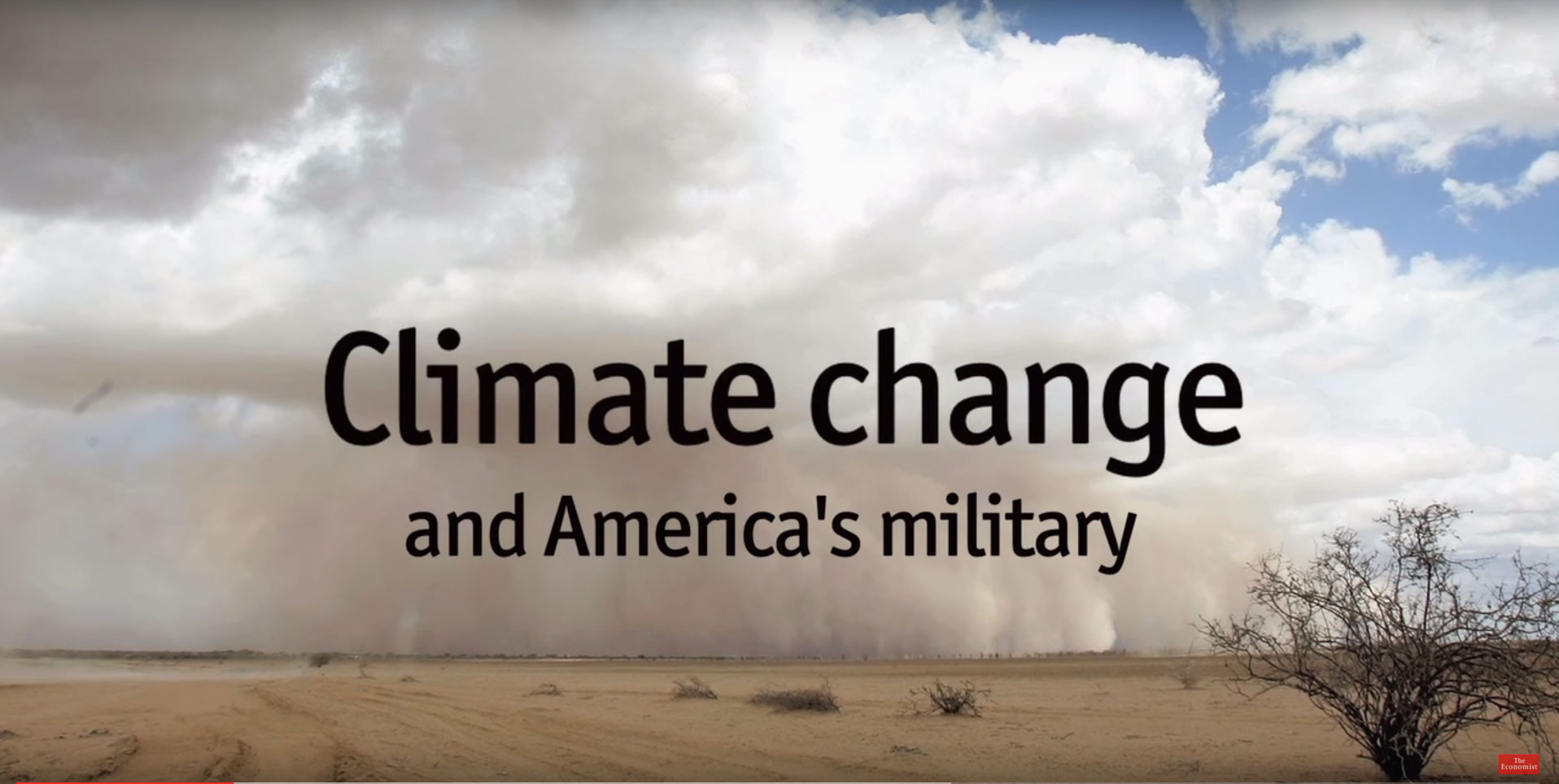
How Militarism Fuels the Climate Crisis
National Priorities Project / The Institute for Policy Studies
The COVID-19 pandemic has utterly changed life as we know it — but it’s also laid bare how Washington’s militaristic budget priorities have left the country woefully unprepared for a crisis.
All this could be a preview of shocks to come as our climate crisis continues unabated.
Today, on the 50th anniversary of Earth Day, we’re excited to share with you a new resource from the National Priorities Project at Institute for Policy Studies: No Warming, No War: How Militarism Fuels the Climate Crisis — And Vice Versa!
We know that the US has invested in the Pentagon over and above all other priorities — and we know that the Pentagon has been crucial to propping up the fossil fuel economy and perpetuating aggression in the name of free-flowing oil.
It’s way past time to break the chain. We put together this report for advocates to help lay out how militarism and the climate crisis are deeply intertwined and mutually reinforcing — and show how a Just Transition can demilitarize our economy while moving us away from fossil fuels.
Among our key findings are these:
• The Pentagon is the world’s largest institutional user of petroleum. Just one of the military’s jets, the B-52 Stratocruiser, consumes about as much fuel in an hour as the average car driver uses in seven years.
• Up to half of all interstate wars since 1973 have been linked to oil. And all over the world, those who fight to protect their lands from extractive industries are often met with state and paramilitary violence.
• Around 200 million people may be displaced by the middle of century due to climate change. As the US continues to ramp up border security, so do threats to all people’s freedom to move and stay.
• Over-investment in the military comes at the high cost of under-investing in other needs, including climate. Compared to the $6.4 trillion spent on war in the past two decades, the cost of shifting the US power grid to 100% renewable is an estimated $4.5 trillion.
True climate solutions, we argue, must have antimilitarism at their core. And demilitarization will go a long way toward winning a green future for us all.
In the face of both COVID-19 and the climate crisis, we urgently need to shift from an extractive economy of war to a regenerative culture of care.
Help us spread the word about this project, on Earth Day and beyond!
If our current times have taught us anything, it’s that our national priorities have failed to account for what really matters — for human health and security, for international cooperation over conflict, and for a just distribution of resources.
We’re experiencing a global and national wake-up call to pay attention to what really matters, and you’re a critical part of the collective solution that we’re building together.
Resources:
• Check out our social media toolkit for facts & graphics to share.
• Or just take a moment to amplify this critical resource from NPP’s Twitter, Facebook, and Instagram.

No Warming, No War: How Militarism Fuels the Climate Crisis — and Vice Versa
Introduction
In a strange twist, it has taken a global pandemic to significantly reduce the world’s fossil fuel emissions.
The COVID-19 pandemic has utterly changed life as we know it — but it’s also laid bare how Washington’s militaristic budget priorities have left the country woefully unprepared for a crisis. With massive shortages in public health resources and shocks to the broader economy throwing Americans off their health care, states are left clamoring for help from the military to cope.
All this could be a preview of shocks to come as our climate crisis continues unabated.
While meaningful climate action has stalled on Capitol Hill and in the White House, planners at the Pentagon have been quietly preparing a militarized, “armed lifeboat” response to climate chaos for years. Unfortunately, the tendency to understand climate change as just another national security issue has misdirected resources away from the programs that we need to mitigate and adapt to a warming climate.
In this report, we’ll lay out how militarism and the climate crisis are deeply intertwined and mutually reinforcing. The military itself, we explain, is a huge polluter — and is often deployed to sustain the very extractive industries that destabilize our climate. This climate chaos, in turn, leads to massive displacement, militarized borders, and the prospect of further conflict.
True climate solutions, we argue, must have antimilitarism at their core.
In the face of both COVID-19 and the climate crisis, we urgently need to shift from a culture of war to a culture of care. Funneling trillions into the military to wage endless wars and project military dominance has prevented us from investing in true security and cooperation. If we don’t transform our society and the way we confront crises, we will face even more unjust and inhumane realities in a climate-changed future.
KEY FINDINGS:
Recognizing that the impacts of climate change will dramatically increase instability around the globe, this paper examines the role of militarism in a climate-changed world. As outlined below, climate change and militarism intersect in a variety of alarming ways:
- The Pentagon is a major polluter. US Militarism degrades the environment and contributes directly to climate change. The Pentagon is the world’s largest institutional user of petroleum; just one of the military’s jets, the B-52 stratocruiser, consumes about as much fuel in an hour as the average car driver uses in seven years. Plans to confront climate change must address militarization, but “greening the military” misses the point entirely. Militarism and climate justice are fundamentally at odds.
- The United States has a well-known history of fighting wars for oil. The fossil fuel industry relies on militarization to uphold its operations around the globe. Oil is the leading cause of war: An estimated one-quarter to one-half of all interstate wars since 1973 have been linked to oil. And all over the world, those who fight to protect their lands from extractive industries are often met with state and paramilitary violence.
- Climate change and border militarization are inextricably linked. It is clear that on a warming planet, cross-border migration will rise. Estimates project that around 200 million people will be displaced by the middle of century due to climate change. As the US continues to ramp up border security, so do threats to all people’s freedom to move and stay. Immigrant justice is climate justice, and challenging militarism is critical to achieving both.
- Over-investment in the military comes at the high cost of under-investing in other needs, including climate. For decades, the US has invested in military adventurism and prioritized military threats above all over threats to human life. Compared to the $6.4 trillion spent on war in the past two decades, the cost of shifting the US power grid to 100% renewable is an estimate $4.5 trillion. The bloated US war economy presents an opportunity to redirect significant military resources, including money, infrastructure, and people, toward implementing solutions to climate change.
- Workers need a way out. The fossil fuel and military sectors mirror each other in the way that workers frequently end up funneled into lethal work due to limited options. We need a Just Transition for workers and communities in both sectors. In order to rapidly transition to a green economy, we must fund millions of jobs in the green economy. Funding the green economy instead of a bloated military budget would be a net job creator; for the same level of spending, clean energy and infrastructure create over 40% more jobs and energy efficiency retrofits create nearly twice the level of job creation.
- Racism and racial oppression form the foundation for both the extractive fossil fuel economy and the militarized economy. Neither could exist without the presumption that some human lives are worth less than others, and racial justice would undermine the foundations of both.
THE MILITARY AND CLIMATE CHANGE
The Pentagon is a major polluter.
Funded by an annual budget of more than $700 billion, the United States has a massive military presence across the globe. With extensive infrastructure and operations both domestically and abroad, the largest industrial military in the history of the world is also among the biggest polluters.
Maintaining an expansive military sprawl requires significant investment in carbon-intensive infrastructure and gas-guzzling equipment. Just one of the military’s jets, the B-52 Stratocruiser, consumes about as much fuel in an hour as the average car driver uses in seven years.
Beyond a significant carbon “boot print,” the US military operations wreaks havoc on the environments it occupies and wages war. Plans to confront climate change must address militarization. With that said, “greening the military” or finding ways to wage eco-friendly war miss the boat. The climate justice movement calls for a restructuring of an extractive economy that is harming people and ecosystems. Such aspirations and militarism are fundamentally at odds.
National Priorities Project
351 Pleasant Street, Suite B #442, Northampton, MA 01060, United States
info@nationalpriorities.org | nationalpriorities.org
NPP is a project of the Institute for Policy Studies.
Posted in accordance with Title 17, Section 107, US Code, for noncommercial, educational purposes